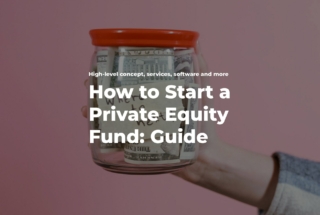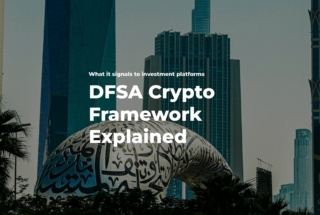Startup Crowdfunding vs Real Estate Crowdfunding Side by Side Comparison
No time to read? Let AI give you a quick summary of this article.
When it comes to alternative investments, startup and real estate crowdfunding offer distinct opportunities for both retail and accredited investors. With relatively low minimum investments, both provide access to markets once dominated by institutional players.
In startup crowdfunding, investors take a high risk for the chance of high rewards with returns realized only if the startup succeeds in an IPO or acquisition which often takes several years.
Real estate crowdfunding, on the other hand, offers a more stable investment approach, with returns driven by rental income and property appreciation. While still illiquid with limited resale options, it provides a steadier, more predictable income stream.
Whether you’re an investor seeking new opportunities1, a fundraiser looking for capital, or a business owner who wants to launch your own crowdfunding platform, this comparison will break down the essentials of startup vs real estate crowdfunding.
| Category | Startups | Real estate |
| Min. investment | $100 – $10,000 | $10 – $25,000 |
| Investors | Retail, accredited | Retail, accredited |
| IRR | 20 – 40% on exit | 10 – 17% |
| Profitability | High-risk, potential for x5 – x100, if successful | 5 – 15% annual return through rental income and property appreciation |
| Holding period | 5 – 10 years | 3 – 10 years |
| Investment type | High-risk, high-reward | Modest risk, income generating |
| Liquidity | Highly illiquid; exit via IPO or acquisition | Illiquid; limited redemption or resale options |
| Investor control | Limited control; passive with occasional voting rights | Passive; managed by platform with periodic updates |
| Taxes | Capital gains tax; potential tax incentives | Ordinary income tax on rents; deductions may apply |
| Platforms | StartEngine, Wefunder, Crowdcube, OurCrowd | EquityMultiple, Fundrise, Crowdstreet, Groundfloor |
What you will learn in this post:
Minimum investment and accessibility
Some startup crowdfunding platforms allow people to invest with as little as $1002, while others cater to accredited investors only and require a minimum of $10,0003.
In contrast, some real estate crowdfunding platforms have significantly lowered the entry threshold for property investments. Fundrise, for example, offers investment opportunities starting at just $104, making it highly accessible to beginners.
On other real estate investment platforms, you’d expect a minimum investment starting from $5,0005 like in the case of EquityMultiple or $25,0006 on CrowdStreet.
Returns and time horizons
Investing in startups is inherently high-risk. But it offers the potential for substantial returns. Angel investors often seek returns of 20% to 40% annually7, with the understanding that many startups may fail.
A study by Wiltbank and Boeker7 found that the average return for angel investments was 2.6 times the initial investment over 3.5 years, equating to a 27% internal rate of return (IRR). However, it’s important to note that successful exits, such as acquisitions or IPOs, can take anywhere from 5 to 10 years and the majority of startups may not yield any return.
Real estate investments typically offer more predictable returns. Some platforms promise their investors average annual returns up to 16%8, depending on the specific investment strategy and market conditions. These returns are often realized through rental income and property appreciation.
Investment horizons can vary, but many real estate crowdfunding projects have holding periods between 3 and 7 years9 or even beyond that to 10+ years. Some platforms offer early redemption options, though these may come with penalties or restrictions.
Investor psychology
Investors who choose startup crowdfunding are attracted by potentially high returns and the idea of supporting innovative projects. There are cases when startups delivered over 200x or even more ROI10.
However, only 1 out of 10 startups survive10, and over 80% of them close within the first three years. Investors shall understand that their investments may not deliver any returns for several years, and their investments may be lost if a startup fails.
This is why investing in startups is more suitable for those who are optimistic about emerging technologies and are willing to accept the possibility of total loss in exchange for the potential of significant gains.
Conversely, real estate crowdfunding attracts those investors who seek more stability and tangible assets. The predictability of rental income and the historical appreciation of property values 11provide a sense of security. Investors in this space often prefer steady, moderate returns and are less inclined to take on the high risks associated with startups. This investment approach is well-suited for those who want to diversify their portfolios with assets with a track record of resilience.
Liquidity and exit options
Investments in startups are generally illiquid12. Once funds are committed, investors typically cannot access their capital until a liquidity event13 occurs, such as an acquisition or IPO.
These events can take many years to materialize, and there’s no guarantee they will occur. This lack of liquidity means investors must be prepared to have their capital tied up for extended periods without the ability to sell or transfer their investment.
While real estate crowdfunding investments are typically considered illiquid, they often offer slightly more flexibility compared to startup equity crowdfunding. Some real estate crowdfunding models incorporate periodic redemption windows or repurchase programs14, where investors may request the return of their invested capital at specific intervals, often quarterly or annually. These redemption features, however, are usually subject to various conditions, including minimum holding periods, limited redemption caps, and potential early withdrawal penalties.
It’s important to note that these redemption options are not contractually guaranteed. During periods of market stress or declining asset valuations, platforms may temporarily suspend redemptions in order to preserve liquidity and protect the integrity of the underlying real estate portfolio.
Investor control and involvement
Investors in startups typically have limited control over the company’s operations. While they may receive regular updates and reports, decision-making authority remains with the company’s founders and executive team.
Some platforms offer voting rights or the ability to participate in certain decisions, but these are generally limited and depend on the size of the investment and the specific terms of the offering.
In real estate crowdfunding, investors usually act as passive participants. They rely on the platform or the project’s sponsors to manage the properties and make operational decisions. Investors receive updates on the performance of their investments and may have access to financial statements and reports, but they do not have a direct say in the management of the properties.
Taxes and legal considerations
Returns from startup investments, such as capital gains from a successful exit, are subject to capital gains tax15. The tax rate depends on the holding period and the investor’s tax bracket.
Additionally, some jurisdictions offer tax incentives16 for investing in startups, such as deductions or credits, which can enhance the after-tax return. However, these benefits vary by location and require careful planning and compliance with specific regulations.
Income from real estate investments, such as rental income17, is typically taxed as ordinary income. However, investors may benefit from various tax deductions18, including depreciation, mortgage interest, and property-related expenses, which can offset taxable income.
Certain investment structures, like Real Estate Investment Trusts (REITs)19, have specific tax implications that investors should understand. This is why it is recommended to consult a tax advisor before you participate as an investor in real estate crowdfunding.
Startup crowdfunding platforms
There are many startup crowdfunding platforms to explore, but to keep it simple, you can get started with some of the platforms below.
Wefunder
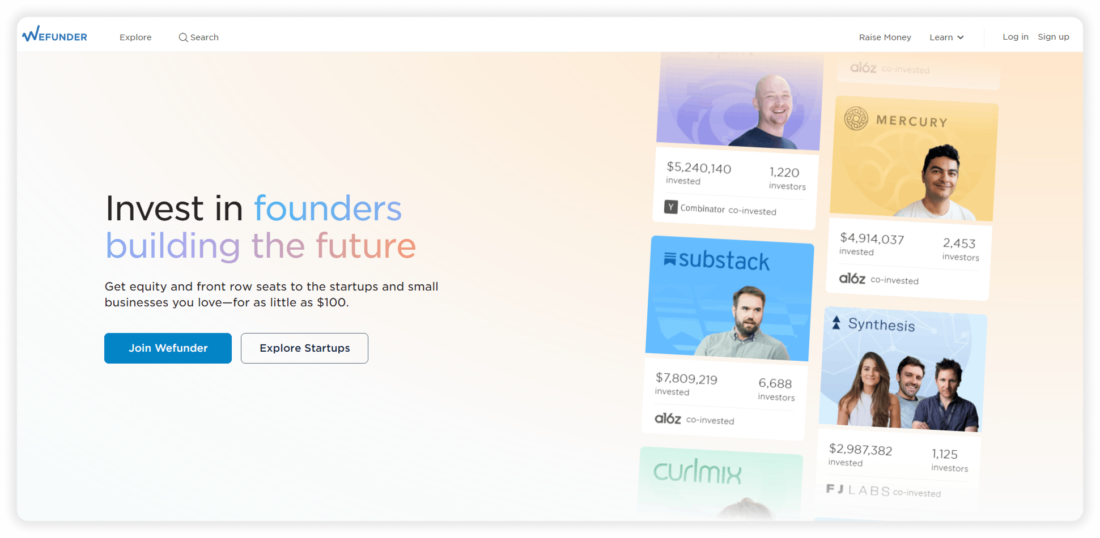
Wefunder20 is a U.S.-based equity crowdfunding platform that enables everyday individuals to invest in early-stage startups and small businesses with as little as $100. Established in 2011, it has become a prominent player in the Regulation Crowdfunding (Reg CF) space, facilitating over $900 million in investments across more than 3,600 companies.
Crowdcube
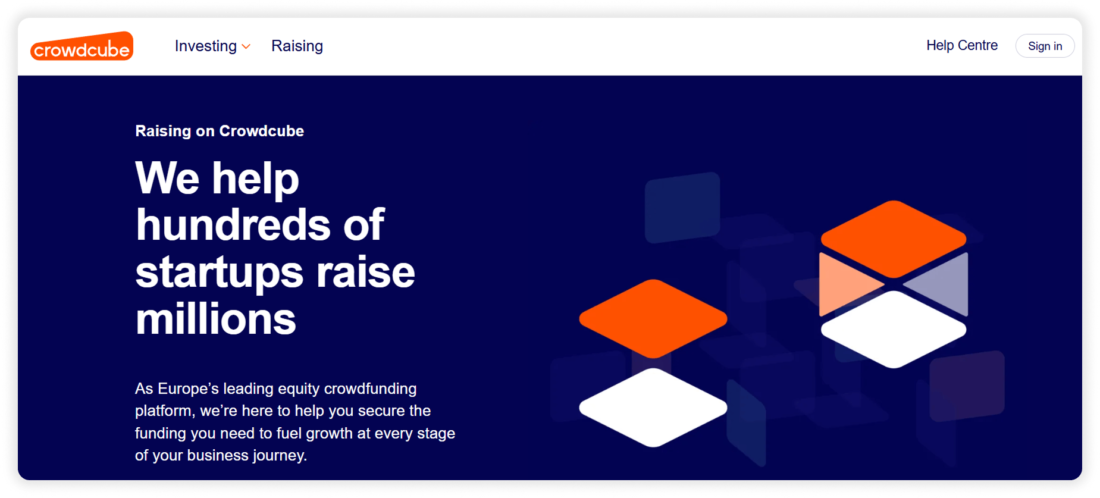
Crowdcube21 is a UK-based equity crowdfunding platform that enables individuals to invest in early-stage and growth-focused businesses. Since its inception in 2011, it has facilitated funding for companies like Monzo, Revolut, and Camden Town Brewery, offering investors the opportunity to become shareholders in these ventures.
StartEngine
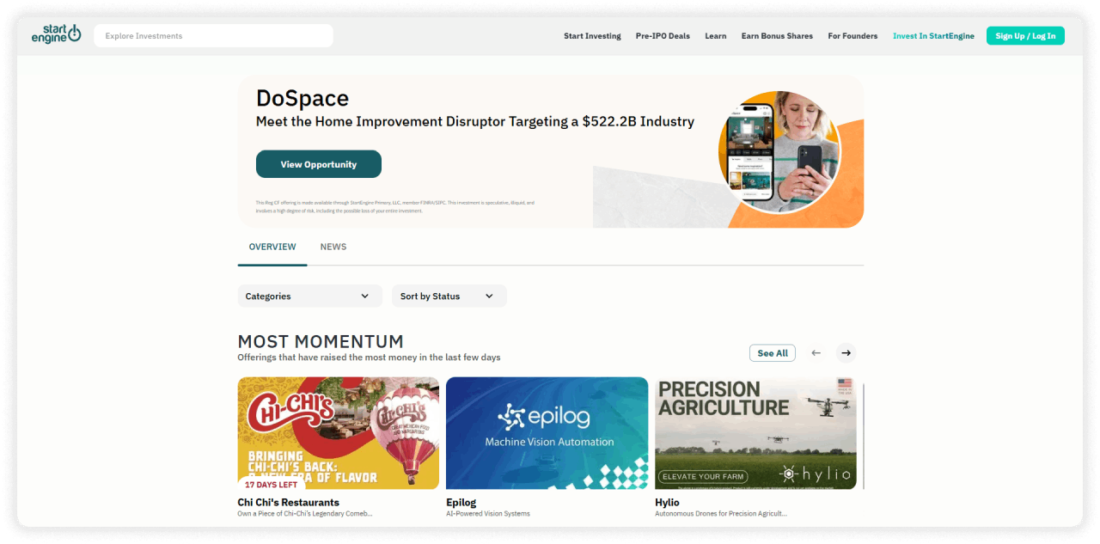
StartEngine22 is a U.S.-based equity crowdfunding platform that enables both accredited and non-accredited investors to invest in startups and early-stage companies across various industries. The minimum investment typically starts at $250, though some offerings may have higher minimums.
OurCrowd
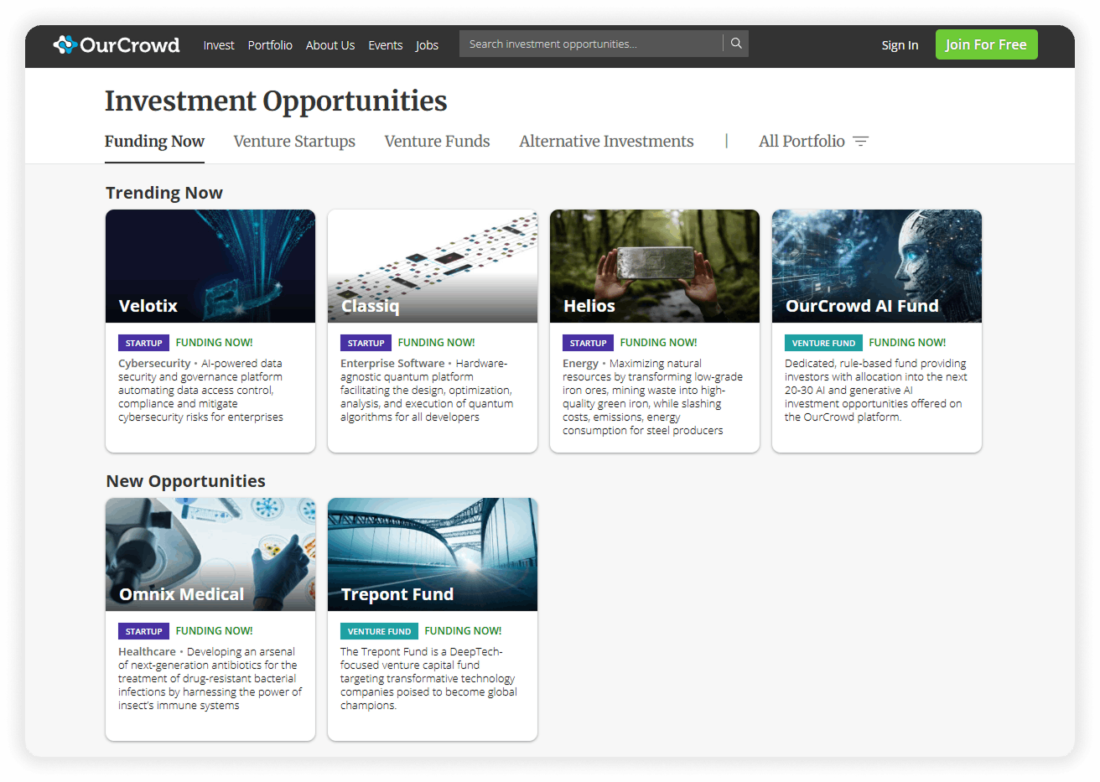
OurCrowd23 is a global venture investing platform that provides accredited investors with access to early-stage startups and venture funds across various sectors, including AI, healthcare, and cybersecurity.
The platform requires a minimum investment of $10,000 for individual startup deals and $50,000 for fund investments. For those seeking diversification with lower per-deal minimums, the Portfolio Select account allows investments of $5,000 per company, starting with a $50,000 deposit.
Real estate crowdfunding platforms
If you are more interested in real estate crowdfunding, you may want to check the following platforms.
Crowdstreet

CrowdStreet 24is a U.S.-based online real estate investing platform that connects accredited investors with commercial real estate projects. Since its inception in 2012, CrowdStreet has facilitated over $4.2 billion in investments across more than 800 projects, offering a range of opportunities including individual properties, funds, and real estate investment trusts (REITs). The platform requires a minimum $25,000 investment.
EquityMultiple

EquityMultiple5 is a U.S.-based real estate crowdfunding platform offering accredited investors access to commercial real estate projects with minimum investments starting at $5,000. It provides a range of investment options, including equity, preferred equity, senior debt, and short-term notes, aiming to deliver institutional-quality deals.
Fundrise
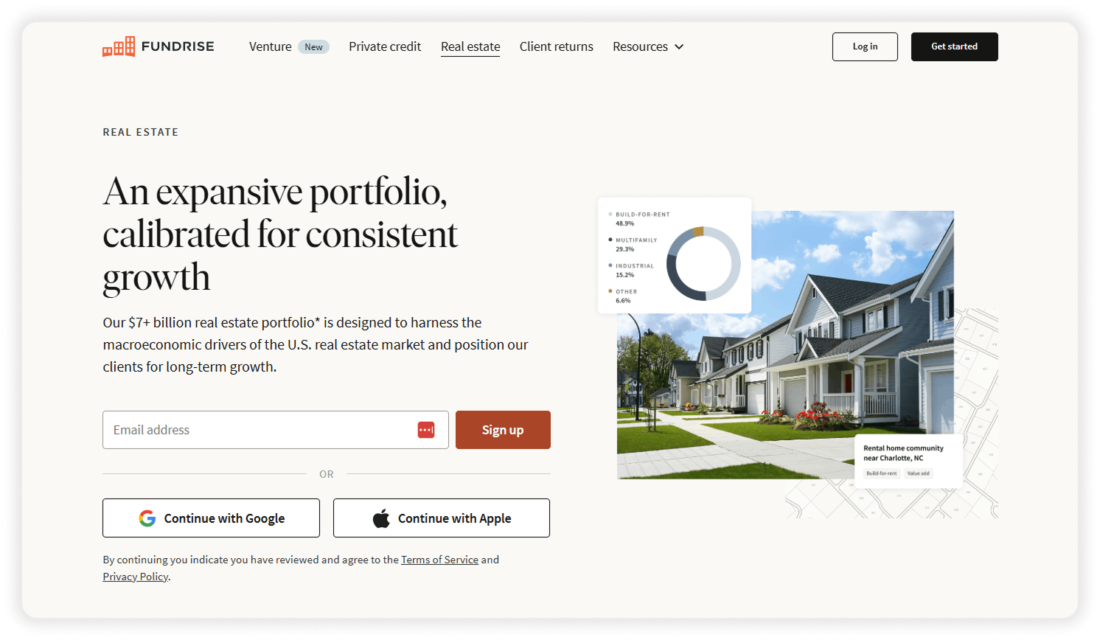
Fundrise25 is a platform that allows individuals to invest in diversified portfolios of private real estate assets with a low entry point.
- Taxable Accounts: The minimum investment is $10, making it accessible to a broad range of investors.
- Retirement Accounts (IRAs): A minimum of $1,000 is required to start investing through an IRA.
Fundrise offers various investment plans tailored to different goals, such as income generation, growth, or a balanced approach. For instance, the Fundrise Income Fund reported a 7.5% current distribution rate and 8.3% trailing 12-month cumulative returns as of December 31, 2024.
Groundfloor
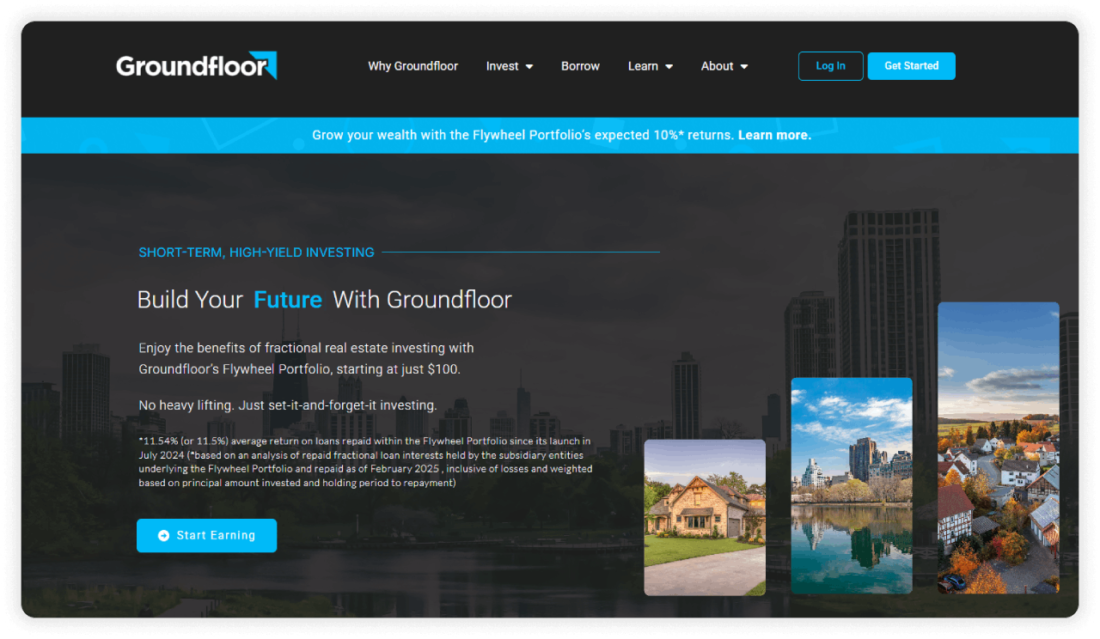
Groundfloor26 is a U.S.-based real estate crowdfunding platform that enables both accredited and non-accredited investors to participate in short-term, high-yield real estate debt investments. With a low minimum investment requirement of $100, Groundfloor offers an accessible entry point for individuals looking to diversify their investment portfolios beyond traditional assets.
The platform specializes in providing loans to residential real estate developers, primarily for fix-and-flip projects. Investors can expect average annual returns ranging from 10% to 12%, depending on the specific loan grades and terms. Each loan is backed by a first-lien position on the underlying property, offering a layer of security for investors.
Build a crowdfunding platform with LenderKit
If you’re a business owner looking to build your own crowdfunding platform for startups or real estate financing, check out white-label crowdfunding software by LenderKit.
LenderKit provides a branded solution that will help you efficiently onboard investors, work with project owners and close more investment deals — all while ensuring compliance with regulations in the US, UK, Europe or Saudi Arabia. We worked with clients beyond the mentioned regions, so we could safely add Canada and UAE to the list.
LenderKit is designed to help you navigate the complexities of crowdfunding by providing a secure, compliant infrastructure that automates your business operations.
With our white-label investment software, you can get started within weeks using a ready-made solution or opt for a more tailored, custom version of your platform.
If you are interested in exploring LenderKit further and seeing how it can help you, don’t hesitate to reach out to us.

Article sources:
- New opportunities
- How Minimums Shape Investment Crowdfunding Outcomes
- Http://invest.ourcrowd.com/404/
- What is the minimum initial investment?
- EquityMultiple | Welcome to Modern Real Estate Investing
- Crowd Street FAQs — Accounts, Investing, Security & More
- 20% to 40% annually
- Real Estate Crowdfunding Historical Returns - Financial Samurai
- 3 and 7 years
- The Risks and Returns of Crowdfunding
- What Is the ROI on Property Investment and How Do You Calculate It? – PropNerd | Insights
- Understanding Liquidity Events in Equity Crowdfunding Platforms - FasterCapital
- SEC.gov | Exit Strategies and Liquidity
- Liquidity in Real Estate Crowdfunding - ArborCrowd
- What Startup Founders Should Know About Capital Gains Tax - Capbase…
- PDF (https://jlarc.virginia.gov/pdfs/oversight/ED_initiatives/SciTech%20Appendix%2...)
- Tips on rental real estate income, deductions and recordkeeping | Internal Revenue Service
- Rental Real Estate Taxes: What Happens When You Own or Sell
- Instructions for Form 1120-REIT (2024) | Internal Revenue Service
- Wefunder
- Just a moment...
- StartEngine
- Investing in the Future: Startup, Venture Capital and Alternative Investments | OurCrowd
- Your Direct Access To Private Market Investing - Crowd Street
- Fundrise
- Invest in Real Estate Without Buying Property

